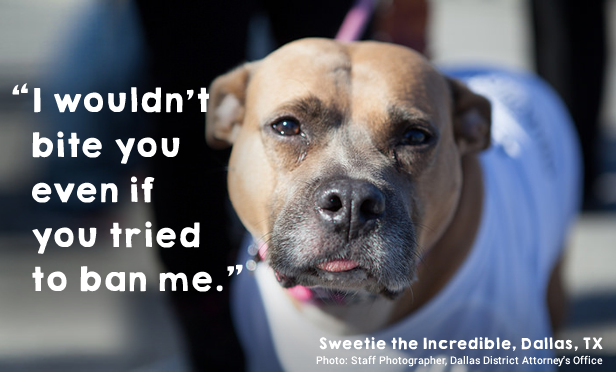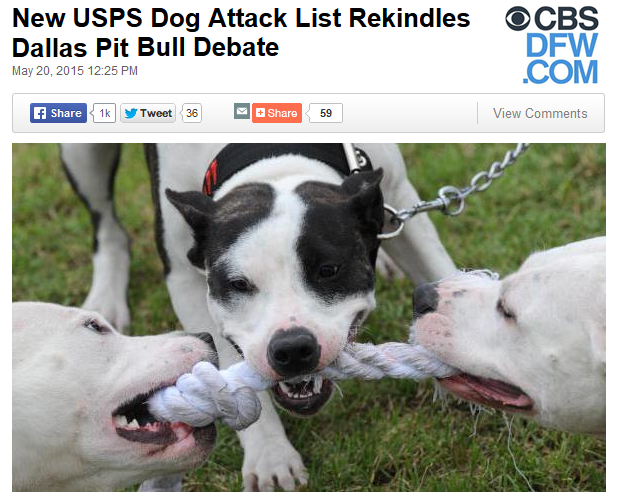Dallas & BSL: Demystifying USPS Dog Attack Report

To kick off National Dog Bite Prevention Week, United States Postal Service released its “Top Dog Attack Rankings by City” last week. A joint effort by the Postal Service, the medical community, veterinarians and the insurance industry, the report was released along with tips to reduce dog attacks to letter carriers and to educate the public that dog bites are avoidable by providing prevention tips.
The City of Dallas ranked 5th worst in the nation in 2014 – recording 43 letter carrier dog bites or attacks. Unfortunately, some city council members see this as an opportunity to bring back BSL, as reported by CBS News.
Two council members in particular are mentioned in this news article:
Dallas City Councilman Rick Callahan: “It’s just reprehensible in this city that we don’t take a tougher stance. I agree with my colleague that we should strongly consider making it illegal to own a pit bull in Dallas, Texas. It’s always the pit bulls, you never hear about the other dogs.”
Dallas City Council Member Dwaine Caraway: “I was leading the charge on banning dangerous dogs, preferably pit bulls. At the end of the day dangerous dogs have no place roaming.” PLEASE NOTE: Caraway also handed Michael Vick a key to the city of Dallas in February 2011.
These 2 council members have set their eyes on BSL for quite some time. From Nov 2014, Dallas News, “Ex-postman, Dallas fight battle against stray dogs”:
Officials say they are working to rectify the loose dog problem citywide. Roberson’s council member, Rick Callahan, said education will be key, and that more people need to spay, neuter and restrain their dogs.
“So many people just permit their animals to roam the streets,” Callahan said. “That’s a violation of the law. We’ll continue to work block by block to keep people re-educated about what the rules, what the laws, what the ordinances are.”
…Council member Dwaine Caraway, who said he has “been raising hell about dogs forever,” complimented the efforts of the city’s code compliance department. But he said there is more work to do.
“Something is going to be done,” Caraway said. “A more aggressive approach will take place, and we will work with council member Callahan, who has been an advocate of trying to get these stray dogs and dogs under control.
As you can see, the problem has always been loose dogs. The 43 letter carrier bites in 2014 is high; however, if you take in the number of housing units, which is 516,639 (according to 2013 Census data, including multi-units), it came down to less than 0.01% of letter carrier dog bite incidents per housing units for the whole year. If you account the number of times mail is delivered to all those units in 2014 (516,639 X 6 days/week X 52 weeks = 161,191,368 mail deliveries aka potential dog bite incidents), the number becomes so insignificant it barely registers (0.000027%).
Now let’s look at the Fiscal Impact of implementing BSL. Using Best Friends BSL Fiscal Impact calculator, estimated animal control costs of BSL in Dallas:
- $1,098,539 for enforcement
- $231,657 for kenneling
- $172,259 for DNA testing
- $183,506 for legal services
- $28,131 for the cost of killing the pets who are confiscated
TOTAL = $1,714,092! These are significant budgetary costs. Download the fact sheet (PDF) which articulates the flaw in BSL further:
Breed-discriminatory laws not only interfere with responsible pet owners’ property rights, but can quickly become a serious burden on local governments and a waste of tax dollars. Undoubtedly, enforcement of such a law drains needed resources from truly important and vital government services, such as fire protection, parks and road maintenance.
In addition, governments that interfere with citizens’ property rights through breed-discriminatory provisions have the burden of proving the heritage of individual pets and providing constitutional due process protections before seizing and housing them. As a result, the costs for enforcement go well beyond the traditional role of animal control services (to target the actual behavior of individual dogs) and into other, more costly areas of local government, frequently involving expensive and lengthy litigation. During the court proceedings, the city is responsible for picking up the tab for housing the dog until the trial and appeal are concluded.
Enforcing a breed-discriminatory law, then, will ultimately deplete the limited resources that The City of Dallas can allocate for animal control and require that the additional funds be taken from other departments or local programs and services.
Bottom line: The Government in Dallas should not waste taxpayer money or interfere with property rights through BSL when the potential incident is less than 0.0001% per housing unit.
________________________
So what are the alternatives? Here are some that has been proven to reduce dog bites incident without enacting BSL:
- Put a stop to leash law violations
- Strengthen and enforce penalties for dangerous owners and their dogs
- Crack down on dog fighting
-
Strengthen animal abuse laws
-
Prevent criminals from owning dogs
-
Regulate breeders
-
Nuisance ordinances
-
Fund public spay/neuter initiatives
-
Educate about dog behavior
-
Encourage responsible dog ownership
Learn more about BSL, why it does not work and alternative solutions.
________________________


